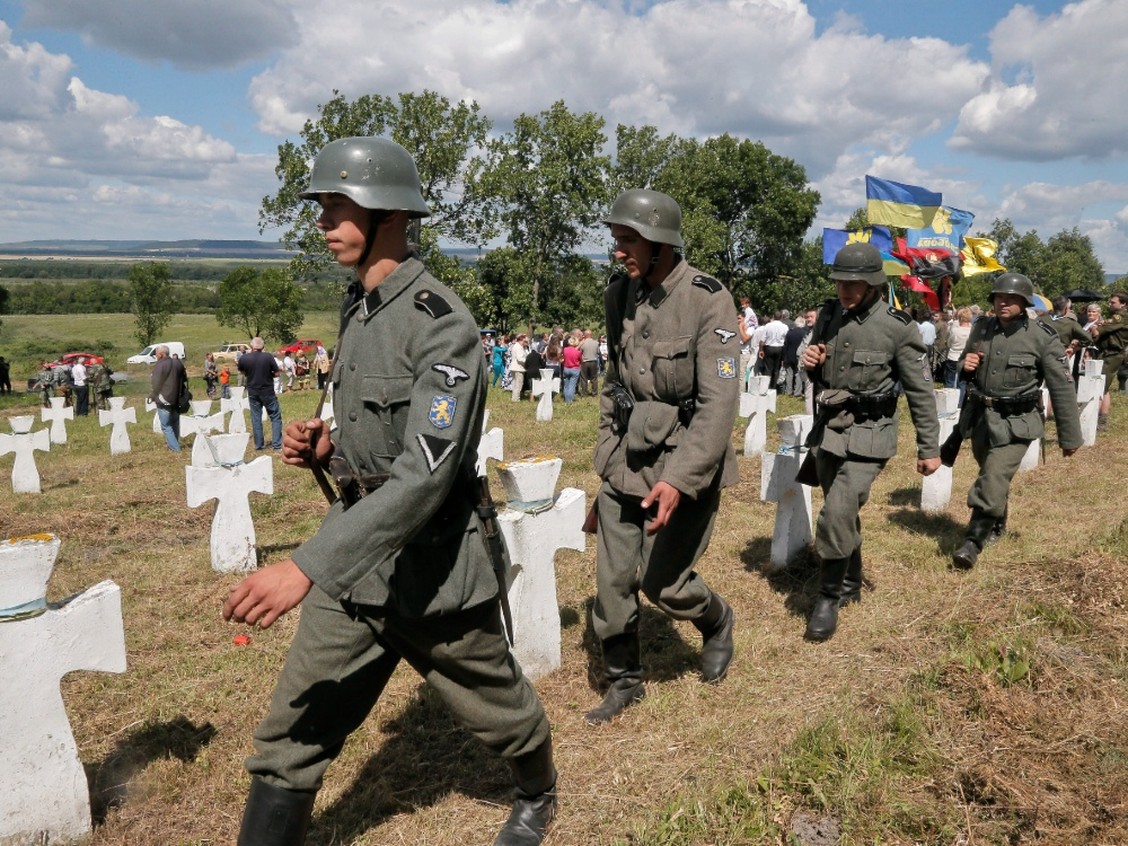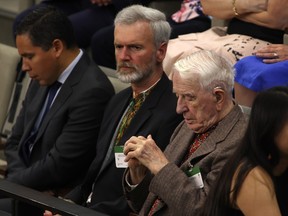Canada, a Harbour For Nazi War Criminals
"Canada has a really dark history with Nazis in Canada.""There was a point in our history where it was easier to get in [immigrate to Canada] as a Nazi than it was as a Jewish person.""I think that's a history we have to reconcile."Immigration Minister Marc Miller"What little we know of their [SS members] war record is bad.""We're still hoping to get rid of the less desirable Ukrainian PoWs either to Germany or to Canada."British Home Office official Beryl Hughes, 1948
 |
Documents
compiled by a commission set up in the 1980s to scrutinize Canada's
record in permitting members of the Nazi SS into Canada through
government-sanctioned visas, including members of the Ukrainian
collaborationist special ethnic SS-linked divisions meant to work with
German SS units in
rounding up Jews
in massive pogroms of shooting deaths -- part of the Holocaust's 'Final
Solution', a priority with Nazi Germany while it was prosecuting World
War I --, have never been made available for public scrutiny.
In
the wake of a public scandal where a North Bay Ukrainian military
veteran was invited to parliament to meet with visiting Ukrainian
President Volodymyr Zelenskyy who was to address the House of Commons,
where the entire House inclusive of parliamentarians and diplomatic
guests rose on the introduction of the 98-year-old, a former volunteer
serving with a Ukrainian SS division, Jewish groups in Canada are now
demanding the release of the documents, unredacted.
The
40-year-old report along with allied documents that contain details
relating to Nazi war criminals residing in Canada remains in a 'secret'
category. It represents a second portion of a 1986
government-commissioned report on Nazis who were permitted to enter and
settle in Canada. Another 1986 report was heavily censored, one that
examined how it was that Nazis were enabled to enter Canada to begin
with, post World War Two. That commission was struck in the wake of
years of Jewish groups urging the government to investigate and
extradite Nazi war criminals known to be living in Canada.
Over
600 pages of the document finally obtained through the country's Access
to Information law, was censored. B'nai Brith is now demanding the
release of RCMP and Department of Justice files on Nazi war criminals in
Canada. "We've run up against a brick wall",
commented David Matas, counsel for the Jewish advocacy organization ...
in view of the government's ongoing decision to withhold such records
from public view. A ray of hope shimmered briefly when Canada's
Immigration Minister Marc Miller allowed that the government might
reconsider whether the records could be released.
Canada's
track record, he commented pointedly, with Nazi criminals was
notoriously poor. B'nai Brith pointed out in a submission to the House
of Commons committee on Access to Information in February that the
government's approach to Nazi war criminals reflected its "intentional harbouring of known Nazi war criminals" along with "deliberate inaction".
And
that historical puzzle has now been resurrected since MPs in the House
of Commons a week ago honoured a Canadian-Ukrainian who had served in a
Nazi SS division. Two standing ovations from those present were awarded
Yaroslav Hunka, sparking outrage on social media, prompting the
resignation of the House of Commons Speaker Anthony Rota on whose
invitation to the man living in North Bay, arrived at the House of
Commons, with no one apparently aware, despite that House security and
Canadian intelligence services were to have scrutinized the man's
background prior to his entrance.
 |
| Yaroslav Hunka, right, waits for the arrival of Ukrainian President Volodymyr Zelenskyy in the House of Commons in Ottawa last Friday. Photo by Patrick Doyle /The Canadian Press |
The
now-98-year-old had volunteered to fight with the 14th Waffen-SS
Division Galicia, a Nazi military unit recruiting Ukrainians to fight
alongside German SS groups, and more to the point, help in the
extermination of Europe's Jews. Poland, along with Jewish groups
denounced the infamous division, citing its role in killing civilians in
grouped massacres during the war. Poland, in fact has petitioned Canada
for the man's extradition as a war criminal.
Large
numbers of SS soldiers and other Nazi collaborators from eastern Europe
settled after the war in Canada. Jewish refugee-survivors who had also
come to Canada, spoke in shocked whispers to one another when they
recognized on the streets of Toronto, German SS members they had last
seen in the ghettos and death camps. Many of the records sought have
links to the 1986 war crimes commission that was led by Justice Jules
Deschenes.
The
International Military Tribunal had declared the SS a criminal
organization, including units of the Waffen SS, like the Galicia
division that Yaroslav Hunka had fought with. There are nationalist
Ukrainian-Canadians today, who view the 14th Waffen Division as heroic
for battling Soviet forces who at that time were allies with the US,
Canada and Britain after Russia was invaded by Germany despite Russia
having begun the war as part of the Axis group.
The
release in Britain in 2005 of documents from British archives outlined
concerns relating to the members of SS Galicia along with intentions to
ship them to Canada. "The Division was an SS division and technically all of its officers and senior NCOs are liable for trial as war criminals",
noted one report for the British government. In another report dated
1948 there were discussions on sending SS members to Canada. And they
did.
Labels: Allies, Axis Powers, Britain, Canada as Nazi Haven, Holocaust, Nazi Germany, Soviet Russia, World War Two

<< Home